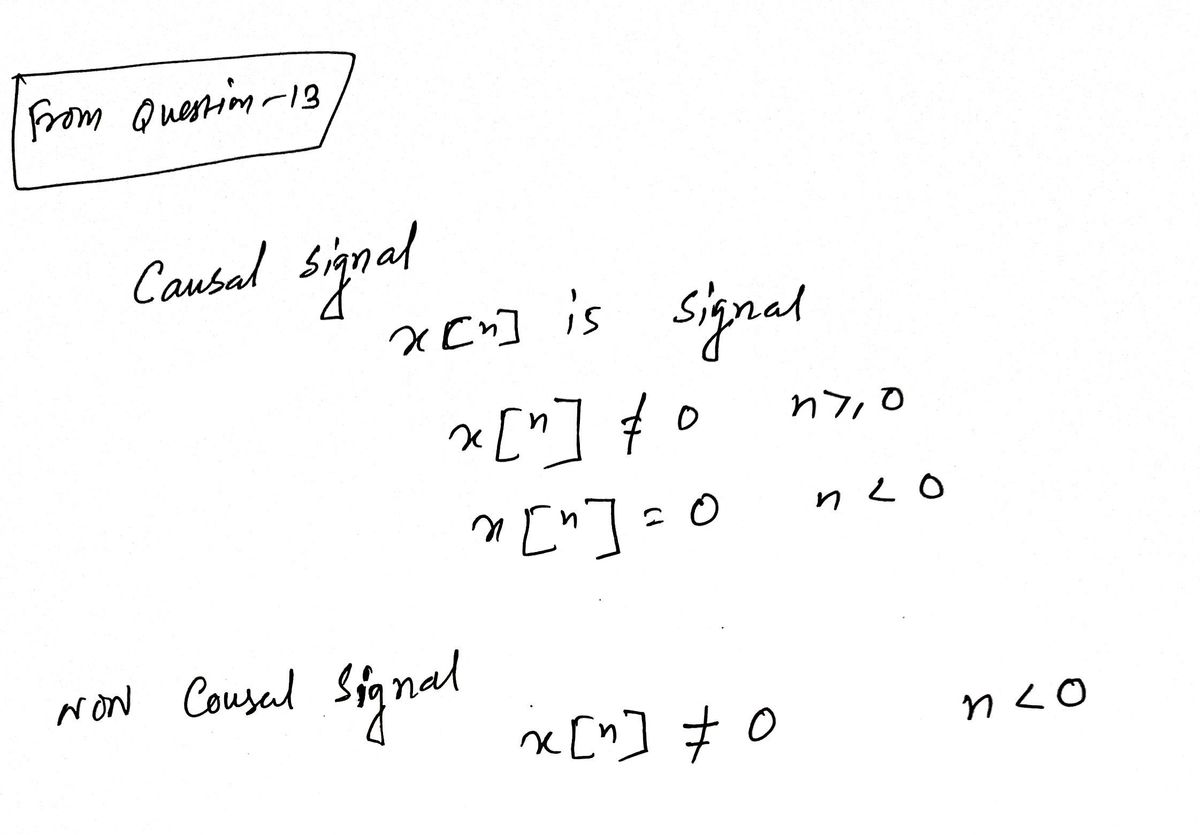QUESTION 13 The only knowledge available about a given system S is that it is not causal. Let g [n] be its impulse response. What can be claimed exactly? For all n20, g[n] =0. For all n20, g[n] 0. There exists n2 0 such thatg [n] =0. There exists n 0 such that g [n]#0. For all n<0, g[n] =0. For all n<0, g[n] 0. There exists n <0 such that g [n]=0. There exists n <0 such that g [n] 0. O None of the above
QUESTION 13 The only knowledge available about a given system S is that it is not causal. Let g [n] be its impulse response. What can be claimed exactly? For all n20, g[n] =0. For all n20, g[n] 0. There exists n2 0 such thatg [n] =0. There exists n 0 such that g [n]#0. For all n<0, g[n] =0. For all n<0, g[n] 0. There exists n <0 such that g [n]=0. There exists n <0 such that g [n] 0. O None of the above
Introductory Circuit Analysis (13th Edition)
13th Edition
ISBN:9780133923605
Author:Robert L. Boylestad
Publisher:Robert L. Boylestad
Chapter1: Introduction
Section: Chapter Questions
Problem 1P: Visit your local library (at school or home) and describe the extent to which it provides literature...
Related questions
Question
100%
![QUESTION 13
The only knowledge available about a given system S is that it is not causal. Let g [n] be its impulse response.
What can be claimed exactly?
For all n20, g [n] =0.
For all n20, g[n] 0.
There exists n2 0 such that g [n]=0.
There exists n O such that g [n]#0.
For all n<0, g[n] =0.
For all n<0, g[n] 0.
There exists n <0 such that g [n]=0.
There exists n <0 such that g [n] 0.
O None of the above
QUESTION 14
Let S be the system such that {y[n]}= S({x [n]}) is defined by](/v2/_next/image?url=https%3A%2F%2Fcontent.bartleby.com%2Fqna-images%2Fquestion%2F6e3992ca-2280-40ba-b65a-68dc98c03d5d%2Fa2d64633-0891-4666-862c-87b7f2465a94%2Fk342k7s_processed.jpeg&w=3840&q=75)
Transcribed Image Text:QUESTION 13
The only knowledge available about a given system S is that it is not causal. Let g [n] be its impulse response.
What can be claimed exactly?
For all n20, g [n] =0.
For all n20, g[n] 0.
There exists n2 0 such that g [n]=0.
There exists n O such that g [n]#0.
For all n<0, g[n] =0.
For all n<0, g[n] 0.
There exists n <0 such that g [n]=0.
There exists n <0 such that g [n] 0.
O None of the above
QUESTION 14
Let S be the system such that {y[n]}= S({x [n]}) is defined by
Expert Solution
Step 1

Step by step
Solved in 2 steps with 2 images

Recommended textbooks for you

Introductory Circuit Analysis (13th Edition)
Electrical Engineering
ISBN:
9780133923605
Author:
Robert L. Boylestad
Publisher:
PEARSON

Delmar's Standard Textbook Of Electricity
Electrical Engineering
ISBN:
9781337900348
Author:
Stephen L. Herman
Publisher:
Cengage Learning

Programmable Logic Controllers
Electrical Engineering
ISBN:
9780073373843
Author:
Frank D. Petruzella
Publisher:
McGraw-Hill Education

Introductory Circuit Analysis (13th Edition)
Electrical Engineering
ISBN:
9780133923605
Author:
Robert L. Boylestad
Publisher:
PEARSON

Delmar's Standard Textbook Of Electricity
Electrical Engineering
ISBN:
9781337900348
Author:
Stephen L. Herman
Publisher:
Cengage Learning

Programmable Logic Controllers
Electrical Engineering
ISBN:
9780073373843
Author:
Frank D. Petruzella
Publisher:
McGraw-Hill Education

Fundamentals of Electric Circuits
Electrical Engineering
ISBN:
9780078028229
Author:
Charles K Alexander, Matthew Sadiku
Publisher:
McGraw-Hill Education

Electric Circuits. (11th Edition)
Electrical Engineering
ISBN:
9780134746968
Author:
James W. Nilsson, Susan Riedel
Publisher:
PEARSON

Engineering Electromagnetics
Electrical Engineering
ISBN:
9780078028151
Author:
Hayt, William H. (william Hart), Jr, BUCK, John A.
Publisher:
Mcgraw-hill Education,